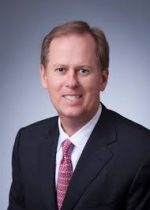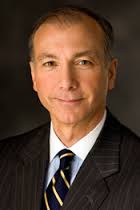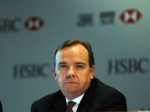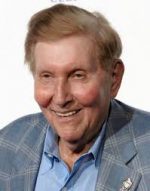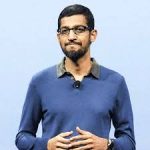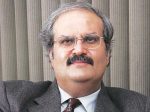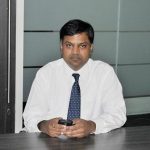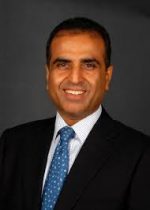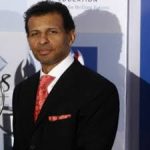Steve Odland is an American businessman. He is President and CEO of the Committee for Economic Development.
Biography:
Early life:
Steve Odland has a Bachelor of Business Administration from The University of Notre Dame, and a master's degree in management from the Kellogg School of Management at Northwestern University.
Career:
He taught as an Adjunct Professor in the graduate schools of business at Florida Atlantic University and at Lynn University from 2010-2011. He was Chairman and CEO of Office Depot from 2005 - 2010, and was Chairman, President, and Chief Executive Officer of AutoZone from 2001 until 2005. He was President & CEO of Tops Markets, Inc. from 1998 to 2000, served as President of the Foodservice Division of Sara Lee Bakery from 1997 to 1998, and worked for The Quaker Oats Company from 1981 to 1996 in various executive positions.
He is a Director of General Mills and Analogic. He is also a Trustee of The Conference Board and a member of the Council on Foreign Relations. He also has been a member of the Business Roundtable; a commissioner on the National Surface Transportation Policy and Revenue Study Commission; a member of the Committee on Capital Markets Regulation; a U.S. Presidential Appointee, President's Council on Service and Civic Participation; a member of the Advisory Council, Institute for Corporate Ethics; a member of the Advisory Council, University of Notre Dame Mendoza College of Business; and a member of the Florida Council of 100.
He is a regular CNBC contributor and has published a blog on Forbes.
Steven A. Kandarian is the president, chairman, and chief executive officer of MetLife. He became president and CEO on May 1, 2011,and chairman in January 2012 succeeding Robert Henrikson, who retired from those roles.
Life and career:
Kandarian grew up in West Hartford, Connecticut, the son of Lillian and Albert Kandarian. He graduated from William H. Hall High School and held several roles in private equity, including as founder and managing partner of Orion Partners, LP and executive director of the Pension Benefit Guaranty Corporation. He is a board member of the Damon Runyon Cancer Research Foundation and a member of the Financial Services Forum and the Economic Club of New York. He received a B.A. from Clark University, a J.D. from Georgetown University Law Center, and a M.B.A. from Harvard Business School.
MetLife:
Prior to becoming CEO, Kandarian was MetLife's chief investment officer since April 2005. As CIO, Kandarian oversaw a number of initiatives that strengthened MetLife's investment portfolio, enhanced the company’s focus on effective risk management and contributed to the bottom line. He is credited with preparing MetLife's portfolio prior to the 2007 recession, partly by anticipating the housing bubble and selling Stuyvesant Town—Peter Cooper Village in Manhattan in 2006.
In his first three months as CEO, Kandarian expanded the company’s senior leadership team with the hiring of Frans Hijkoop to head human resources and Martin Lippert to oversee global technology. He also announced MetLife’s 25-year agreement to acquire the naming rights to the home of the New York Giants and New York Jets, which is now known as MetLife Stadium.
In addition, Kandarian has also moved the company away from retail banking. On July 21, 2011, MetLife said the company would seek to sell its deposit banking business. In announcing the move, Kandarian said it "was not appropriate for the overwhelming majority of our business to be governed by regulations written for banking institutions." Three months later, MetLife said it would look to sell its residential mortgage lending business as well, saying the marketplace and regulatory environment for the business was uncertain and that the company needed to focus its resources on its global insurance and employee benefits businesses.
Pension Benefit Guaranty Corporation:
Kandarian is a former executive director of the Pension Benefit Guaranty Corporation.an agency of the United States Government. Kandarian was appointed to head the PBGC on Dec. 2, 2001, by Secretary of Labor Elaine L. Chao, announcing his departure in January 7, 2004 to return to his family in Boston. He left on February 13, 2004.
Protests:
In May 2016, Kandarian became the target of protests by animal rights activists angered at MetLife's partnership with the New York Blood Center (NYBC), which abandoned 66 lab chimpanzees with no food and water on islands in Liberia. The chimpanzees, who were used by NYBC in invasive medical experiments for over the course of three decades, have earned the organization an estimated $500 million dollars in royalties. The protests, which have taken place at Kandarian’s home in Summit, NJ, and at the MetLife building in NYC, were staged after activists’ year-long attempts to meet with Kandarian and MetLife were rebuffed. World renowned primatologist Dr. Jane Goodall has dismissed NYBC’s claim that the Liberian government should pay for the care of the chimps: "This seems irrelevant since NYBC was responsible for funding the acquisition of these chimpanzees, some of whom were taken from the wild after shooting their mothers”.
Stuart Thomson Gulliver (born 9 March 1959) is a British banking business executive. He is the current Group Chief Executive of HSBC, a position he has held since 1 January 2011.
Gulliver was born in Derby, England, and holds a degree in Jurisprudence from Worcester College, Oxford. He officially lives in Hong Kong; and has a primary residence in Kensington, London. The Guardian revealed he sheltered £5,000,000 in a Panamanian company with a Swiss HSBC account.
Early life and education:
He was born in the UK in 1959. His father Philip was a legal executive, while his mother Jean was personal assistant to the senior engineer at a local dockyard. Gulliver went to Grammar school in Plymouth, Devon.
Gulliver was an avid boxer while at Oxford, where he studied law and received a Masters degree in Jurisprudence. In a 2011 interview to Financial Times, Gulliver recalls his humble upbringing and his childhood aspiration, and said: "I wanted to be a barrister, but my parents couldn’t afford it".
Professional career:
Early Career and HSBC (1980-2010):
In 1980, an HSBC executive serving in India urged him to join HSBC's elite international officer programme, as it was called at that time, which paved the way for his banking career. Gulliver rose through the ranks in the bank’s Global banking and markets division,[10] and held a number of key roles in the group’s operations worldwide; including postings in London, Hong Kong, Tokyo, Kuala Lumpur and the United Arab Emirates.
During the 1990s, Gulliver built HSBC’s investment banking business in Hong Kong and turned HSBC's Asian markets business into one of the group's major money-spinners, even in the aftermath of the Asian financial crisis. He served as the head of treasury and capital markets in Asia-Pacific from 1996 to 2002.
He was appointed a Group General Manager in 2000, and later he led the Global Markets division from 2002 to 2003. He moved back to London in early 2003 to co-head the Group's Global corporate, investment banking and markets division along with John Studzinski. In March 2004, he joined the Group Management Board as a Group Managing Director. Upon the departure of John Studzinski in 2006, he was appointed Chief Executive of Global Banking and Markets and HSBC Global Asset Management in May 2006.
He was a director of HSBC North America holdings Inc. until 7 May 2009; of HSBC Bank Middle East ltd from 15 February 2010 to 1 May 2011; of HSBC Latin America Holdings (UK) Limited until 4 December 2009.
He is Deputy Chairman of the Supervisory Committee of HSBC Trinkaus & Burkhardt AG (since September 2007; member since May 2006); non-Executive Chairman and a Director of HSBC France since January 2009; and Chairman of HSBC Private Banking Holdings (Suisse) SA since February 2010 (Director since September 2007).
He was made a director of The Hongkong and Shanghai Banking Corporation Limited in September 2006 and has been an Executive Director of HSBC Holdings plc since May 2008.
Group CEO of HSBC (2010-present):
On 7 September 2010, Stephen Green,the then Group Chairman of HSBC, announced that he would step down, in order to accept the invitation of the UK Prime Minister to become Minister of State for Trade and Investment in January 2011. As a result of Stephen Green's decision to step down earlier than planned, Michael Geoghegan, the then Group CEO of HSBC, announced his retirement and Stuart Gulliver, who led HSBC's investment-banking division since 2006, was appointed as the new Group CEO of HSBC Holdings plc, effective 1 January 2011.
He was also appointed the Chairman of The Hongkong and Shanghai Banking Corporation Limited, a wholly owned subsidiary of HSBC Holdings plc.
In 2011, he was included in the 50 Most Influential ranking of Bloomberg Markets.
In 2014, he received a total of £7.6 million in pay and bonuses.
- Subrah S. Iyar (b. 1957) is a leading technocrat, entrepreneur and Web conferencing pioneer of Indian origin. He is the founder and CEO of WebEx which has recently merged with Cisco Systems.
Early life
Subrah S. Iyar was born and brought up in Mumbai, in a Tamil family. He did his schooling in Mumbai and graduated from the Indian Institute of Technology. On completion of his graduation he moved to the US in 1982. He worked with Intel, Apple Inc., Quarterdeck, and Teleos Research prior to the establishment of WebEx.
Founding of WebEx
Iyar chose to take the path of an entrepreneur in 1996, when he founded WebEx in partnership with Min Zhu.
The founding of the company by Subrah Iyar was fuelled by a new-found interest in web conferencing. Min Zhu, a Stanford-trained System Engineer had been struggling to develop a web-conferencing tool. Coincidentally, during this time, he befriended Subrah Iyar who was running Quarterdeck's research lab and the two formed a partnership.
Growth of WebEx
WebEx struggled to make a profit in its early days, largely because of low bandwidth. However, with the advancement of technology and the shift to broadband technology, it began to emerge as a potent competitor with clients such as Hoover's Online, Oracle and Tibco Software. WebEx went on to receive its first funding of $25 million in December 1999.
As a result of the new ideas propounded by Subrah Iyer, 2000 became a honeymoon year for WebEx. The revenues crossed the million mark and Subrah Iyar's own net worth rocketed from a paltry $450,000 in January 2000 to $129 million in November 2000. When enquired about it in an interview at a later stage, Subrah Iyar remarked: "It didn't get too scary, because I knew we had done everything based on fundamentals. You always have a feeling of uncertainty. But it was never a feeling of terror."
In 2003, when Microsoft purchased conferencing company Placeware it was thought to be the end of the road for Subrah Iyar and WebEx. However, WebEx survived and completed a $45 million acquisition of Intranets.com in 2005. In fact, as per the company website, more than 3.5 million people use Cisco’s WebEx products every month to communicate and collaborate online.
On March 15, 2007, Cisco Systems purchased WebEx for $3.2 billion.
Founding of Moxtra
In 2012, Iyar became Co-Founder and CEO of Moxtra, Inc. While working at WebEx, Iyer noted the need for the adhoc meeting for people on the move, it was this need that lead to the inspiration of the Moxtra app. Moxtra is a mobile content collaboration app that received its first round of funding by Cisco and KDDI from Japan.
Sumner Murray Redstone (born Sumner Murray Rothstein; May 27, 1923) is an American businessman and media magnate. He is the majority owner and chairman of the board of the National Amusements theater chain. Through National Amusements, Redstone and his family are majority owners of CBS Corporation and Viacom (itself the parent company of Viacom Media Networks, BET Networks, and the film studio Paramount Pictures). According to Forbes, as of September 2015, he was worth US$5 billion.
Redstone was formerly the executive chairman of both CBS and Viacom. In February 2016, at the age of 92, a week after a court-ordered examination by a geriatric psychiatrist, Redstone resigned both chairmanships, replaced by Leslie Moonves at CBS and Philippe Dauman at Viacom. Redstone then became chairman emeritus.
Early life and education:
Sumner was born to a Jewish family in Boston, Massachusetts, to Belle (née Ostrovsky) and Michael Rothstein. In 1940, at Sumner's behest his father agreed to change the family surname from "Rothstein" to "Redstone" ("Red stone" is a literal translation of the German-Jewish name, "Rothstein").Michael Rothstein owned Northeast Theater Corporation in Dedham, Massachusetts (the forerunner of National Amusements) and the Boston branch of the Latin Quarter Nightclub.
Redstone attended the Boston Latin School, from which he graduated first in his class. In 1944, he graduated from Harvard College,where he completed the studies for his baccalaureate in three years. Later, Redstone served as First Lieutenant in the United States Army during World War II with a team that decoded Japanese messages. After this military service, he worked in Washington, D.C., and attended Georgetown University Law Center. He transferred to Harvard Law School and received his law degree in 1947.
After completing law school, Redstone served as special assistant to U.S. Attorney General Tom C. Clark (who later served as Associate Justice of the Supreme Court of the United States from 1949 to 1967) and then worked for the United States Department of Justice Tax Division in Washington, D.C. and San Francisco, and thereafter entered private practice. In 1954, he joined his father's theater chain, National Amusements and in 1967, he became CEO of the company. As the company grew, Redstone came to believe that content would become more important than distribution mechanisms: channels of distribution (in varied forms) would always exist, but content would always be essential (Redstone coined the phrase, "Content is king!"). He invested in Columbia Pictures, Twentieth Century Fox, Orion Pictures, and Paramount Pictures (Redstone's Viacom would buy Paramount in the 1990s), all of which turned over huge profits when he chose to sell their stock in the early 1980s.
In 1979, he suffered severe burns in a fire at the Copley Plaza hotel, in Boston, but survived after thirty hours of extensive surgery at Massachusetts General Hospital. Though he was warned that he might never be able to live a normal life, eight years later he was fit enough to insist on playing tennis nearly every day and to launch a hostile takeover of Viacom.Redstone has discussed the story of surviving the fire as a reflection of his strong determination and will to live.
Philanthropy:
Sumner Redstone has contributed over $150 million to various philanthropic causes.
In April 2007, Sumner M. Redstone announced a commitment of $105 million in charitable grants to fund research and patient care advancements in cancer and burn recovery at three major non-profit healthcare organizations. The cash contributions of $35 million each will be paid out over five years to FasterCures/The Center for Accelerating Medical Solutions, based in Washington, D.C.; the Cedars-Sinai Prostate Cancer Center in Los Angeles, California; and the Massachusetts General Hospital in Boston, Massachusetts.
Over the last few years, Redstone has contributed $1.5 million to the Global Poverty Project.
He has given millions of dollars to the Cambodian Children's Fund, a nonprofit program that provides a wide range of critical health and educational services to impoverished and abused children in the capital city of Phnom Penh. Redstone's contribution will be used to create the Sumner M. Redstone Child Rescue Center, a stand-alone facility scheduled to open during the fall of 2007 for children 5 to 16.
In early 2010, Redstone pledged a $1 million gift to Autism Speaks in support of scientific research into the causes of autism and effective treatments. Redstone had given financial support to Autism Speaks previously.In 2011, Redstone gave an additional $500,000 to the group in support of its Translational Research Initiative, bringing his cumulative lifetime contribution to Autism Speaks to $1.7 million.
In July 2010, Redstone donated $24 million to the Keck School of Medicine of the University of Southern California to support cancer research.
In September 2012, Redstone donated $18 million to the Boston University School of Law. The gift funded, in part, the construction of the five-story Sumner M. Redstone Building, a classroom building which opened in 2014.
Since October 2012, Redstone has donated a total of $350,000 to the Go Campaign, which funds projects in 21 countries with a focus on helping orphans and other needy children.
In May 2013, the Sumner M. Redstone Charitable Foundation donated $1 million to Literacy Inc., a New York City-based nonprofit literacy organization.
In January 2014, it was announced that the Sumner M. Redstone Charitable Foundation had donated $10 million to Harvard Law School for public-interest fellowships, the largest charitable contribution ever made to the law school in support of public service. The money supports students who work in public-interest positions after graduation.
Full Name : Pichai Sundararajan
Born : 12th - Jul - 1972
Height : 178 CMS ( 5 Feet 10 Inches )
Birth Place : Madurai, Tamil Nadu
Country : India
Education : Indian Institute of Technology Kharagpur, Stanford University California,
Wharton School of the University of Pennsylvania
Occupation : CEO
Industry : Internet
Net worth : $150 Million
Biography:
Google surprised the world by announcing the appointment of a new CEO on 10th August 2015. It became a proud moment for the Indian community to see an Indian-born make it to the list of the CEOs in the Tech. Industry. Sundar Pichai, a name now well-known across the globe has had his share of struggle before making it to the top.
Early Life and Childhood:
Pichai Sundararajan, more commonly known to us as Sundar Pichai was born in Madurai, in the state of Tamil Nadu, India, on July 12, 1972. He belongs to a lower middle-class family and had never experienced the luxury of watching television or traveling by car in his childhood.
His father Raghunath Pichai worked as an Electrical Engineer in General Electric in Chennai and therefore, the family lived in the city, at Ashok Nagar. His father was the manager of a factory that made components for electrical objects. The stories of the work challenges faced by his father always inspired Pichai.
His mother, Lakshmi, was a Stenographer until she gave birth to her kids. Sundar has a younger brother as well.
Pichai saw technology in his hands at the age of 12 when his father bought a land line phone for the house. He had an extraordinary skill of memorizing and remembering numbers. He could keep in mind all the numbers he dialed. Pichai was not only good with numbers whilst at school but also the captain of his high school cricket team.
Education:
Sundar completed his Class X at Jawahar Vidyalaya, at Ashok Nagar and completed the Class 12 from Vana Vani School at Chennai. Pichai then graduated in Metallurgical Engineering from IIT Kharagpur.
He completed his MS (Masters in Science) in Material sciences and Engineering from Stanford University and later went on to complete an MBA from the Wharton School at the University of Pennsylvania.
Pre-Google Career:
Sundar Pichai worked for McKinsey & Company in management consulting during his pre-Google days. He also contributed his talents in engineering and product management at Applied Materials.
Career at Google:
Pichai joined Google in 2004 and is known to have worked on popular products like Toolbar. He also has worked on other products Google Gears and Google Pack, before Chrome was launched.
However, the success of the Toolbar helped Pichai pace his career. Google noticed that the toolbar increased the user searches. This eventually led to the start of Google Chrome; Google’s very own browser.
Pichai has led product management and also found Google’s client software products such as Google Chrome and Chrome OS. Pichai is the man responsible for driving Google’s Chrome OS and browser to the fore. He was appointed as VP of product development in 2008. He introduced Chrome browser to the world. Soon it was followed by Chrome OS in 2009. Pichai came more into the public limelight at Google presentations from 2008 and very soon became a well-known face of Google. He was the Senior VP of Chrome and apps by 2012.
It was in 2013 that Pichai became a well-known personality worldwide. He stepped into the shoes of Andy Rubin as the overseer of all Android related products, almost after a decade at Google.
In 2015, Sundar was announced to be the new CEO of Google as their well-known leader; Larry Page was retiring from Google to take up the reigns at Alphabet, Inc. their new holding company. Earlier that year, he was announced to be the Product Chief at Google by Larry Page himself.
He was also a running contender for the post of Microsoft's new CEO, a job that ultimately went to Satya Nadella.
Personal Life:
Sundar Pichai married his longtime girlfriend, Anjali Pichai. They were classmates when they studied together in IIT Kharagpur. Together, Anjali and Sundar have two beautiful kids; a son and a daughter.
They have bought a house in Brooklyn, New York for $6.8 million. As he is right now a citizen of US, he resides there with his entire family.
Achievements:
The man responsible for the smooth ties with partners like Samsung is believed to be Sundar Pichai. Android was added by Sundar Pichai to the Google products he oversees on 13 March 2013. Andy Rubin formerly managed Android.
Sundar Pichai serves as a Member of Board of Advisors at Ruba, Inc. He headed Jive Software from April 2011 until 30 July 2013.
Google appointed Pichai CEO on August 10, 2015, after previously being appointed Product Chief by then-CEO Larry Page on 24 October 2014.
He has made over $100.5 million in the year 2015.
Awards:
2015 - Alumnus IIT Kharagpur
Sunil Duggal is an Indian entrepreneur and business executive. He is the current Chief Executive Officer of Dabur, India's largest Ayurvedic medicine manufacturer.
Sunil Duggal is the present CEO of Dabur. He joined the Ayurvedic medicine producer in 1995. Today, the brand is a household across India. Twenty years ago, Duggal joined Dabur as General Manager (Sales and Marketing) and basically took care of the Family products Division. Under his dynamic leadership, this particular division saw an unprecedented growth in profits. After a long, enduring stint of hard work, Duggal was made the Vice-president of this division. But the success story did not end there, he was made the Director of Sales and Marketing, Dabur India Limited in 2000.
Duggal is a BITS, Pilani graduate in Electrical and Electronics Engineering and he also holds an MBA from IIM-Calcutta.He has previously worked for Wimco, The Times Of India and also Pepsi Foods. His experience in all these corporations equipped him with the tools and techniques to reach great heights of success at Dabur.
What is motivating about Duggal is the fact that under his leadership, Dabur has heavily invested in rural infrastructure for the growth of its various sectors. He stands testimony to Gandhiji’s statement that the real India resides in its villages. But sadly enough, according to Duggal, the dynamic rural growth is now showing signs of a slowdown. Despite the pessimism surrounding the viabililty of investing in the rural infrastructure, Duggal made sure that Dabur doubled its investments there. His only regret today is that the growth story in rural areas has not reached its full potential.
He also believes that employment generation techniques are not fully being implemented, which is leading to losses for the nation’s economy. But Duggal is not sitting with folded hands – he believes in the immense potential of the rural areas and therefore, he is ensuring that the company does not stop investing in rural infrastructure and employment generation.
Being a dynamic visionary, the few losses incurred in this endeavour do not pose a grave challenge for him – since Dabur has expanded its outreach to the US and UK as well, and the profit margins are quite high, it accounts for the mitigation of the losses, which are few and far between, in the rural sector.
He does not shy away from taking risks and believes in empowering his employees to take their own decisions with respect to company matters. He does not believe in any unfair hierarchical set-ups which might hinder the way in which the employees in an organisation improvise and take decisions which are fruitful for the organisation. This belief in the potential of the employees and their decisive capability has stood Duggal in good stead.
Mr. Sunil Khairnar serves as a Director of Topworth Group of Companies. Mr. Khairnar is a vastly experienced professional in the food and agribusiness sector in India. He has keen interest and is deeply involved in integration of small and marginal farmers into market systems and also works towards optimum utilization of IT and Internet Applications in Agriculture and Rural Development. He is on the boards of a large livelihood based Micro Finance organization based in Hyderabad and a company setting up an Ultra Mega Food Park in Karnataka.
Mr. Khairnar served as a Director of National Bulk Handling Corporation Ltd. He was the founder director in an Indo-Australian joint venture for bio diesel from jatropha called Mission Biofuels India Pvt. Ltd. His knowledge and expertise stands him in good stead to drive the Corporate Social Responsibility (CSR) activities and Public Affairs for the Financial Technologies group. Mr. Khairnar's mandate includes conceptualizing and implementing CSR projects. Prior to Financial Technologies, he worked in the food and agribusiness sector in India for more than 14 years. After working in various commercial functions with the Godrej group and Cargill Inc. for 7 years, he conceptualized and set up Indian Agribusiness Systems Pvt. Ltd. He founded Indian Society of Agribusiness Professionals (www.isapindia.org) which works in agriculture and rural development in 18 Indian states.
Mr. Khairnar has been on various committees connected with agriculture at the Planning Commission, Prasar Bharti and various Govt. Departments. He contributes on the advisory boards of development journals and an agricultural university. He was elected to the Ashoka Fellowship of the Ashoka Foundation in the USA in 2001. He is the Founder Member of Rural Marketing Association of India. Mr. Khairnar is a graduate in Agriculture Engineering and a Post Graduate in Management from IIM, Ahmedabad.
Sunil Bharti Mittal (born 23 October 1957) is an Indian entrepreneur, philanthropist and the founder, chairman and Group CEO of Bharti Enterprises, which has interests in telecom, retail, financial services, and agri business. The Group flagship Bharti Airtel, with operations in 20 countries across Asia and Africa and a customer base of over 275 million, is India's largest telecom company and world's third largest mobile operator. Bharti Airtel clocked revenues of over USD 14.5 billion in FY2013. He is listed as the 8th Richest person in India by Forbes with a Net worth of $7 Billion.
In 2007, he was awarded the Padma Bhushan, India's third highest civilian honor. On 1 July 2013 he was elected Vice-Chairman of the International Chamber of Commerce Entrepreneurial ventures.
A first generation entrepreneur, Mittal started his first business in April 1976 at the age of 18, with a capital investment of ₹20,000 (US$300) borrowed from his father. His first business was to make crankshafts for local bicycle manufacturers.
In 1980, he along with his brothers Rakesh, Rajan started an Import Enterprise named Bharti Overseas Trading Company. He sold his bicycle parts and yarn factories and moved to Mumbai. In 1981, he purchased importing licences from exporting companies in Punjab.[11] He then imported thousands of Suzuki Motors's portable electric-power generators from Japan. The importing of generators was suddenly banned by the then Indian Government.
In 1984, he started assembling push-button phones in India,[11] which he earlier used to import from a Taiwan company, Kingtel, replacing the old fashioned, bulky rotary phones that were in use in the country then. Bharti Telecom Limited (BTL) was incorporated and entered into a technical tie up with Siemens AG of Germany for manufacture of electronic push button phones. By the early 1990s, Mittal was making fax machines, cordless phones and other telecom gear. Mittal says, "In 1983, the government imposed a ban on the import of gensets. I was out of business overnight. Everything I was doing came to a screeching halt. I was in trouble. The question then was: what should I do next? Then, opportunity came calling. While in Taiwan, I noticed the popularity of the push-button phone -- something which India hadn't seen then. We were still using those rotary dials with no speed dials or redials. I sensed my chance and embraced the telecom business. I started marketing telephones, answering/fax machines under the brand name Beetel and the company picked up really fast.". He named his first push-button phones as 'Mitbrau'.
In 1992, he successfully bid for one of the four mobile phone network licences auctioned in India. One of the conditions for the Delhi cellular license was that the bidder have some experience as a telecom operator. So, Mittal clinched a deal with the French telecom group Vivendi. He was one of the first Indian entrepreneurs to identify the mobile telecom business as a major growth area. His plans were finally approved by the Government in 1994 and he launched services in Delhi in 1995, when Bharti Cellular Limited (BCL) was formed to offer cellular services under the brand name AirTel. Within a few years Bharti became the first telecom company to cross the 2-million mobile subscriber mark. Bharti also brought down the STD/ISD cellular rates in India under brand name 'Indiaone'.
In May 2008, it emerged that Sunil Bharti Mittal was exploring the possibility of buying the MTN Group, a South Africa-based telecommunications company with coverage in 21 countries in Africa and the Middle East. The Financial Times reported that Bharti was considering offering US$45 billion for a 100% stake in MTN, which would be the largest overseas acquisition ever by an Indian firm. However, both sides emphasize the tentative nature of the talks, while The Economist magazine noted, "If anything, Bharti would be marrying up," as MTN has more subscribers, higher revenues and broader geographic coverage. However, the talks fell apart as MTN group tried to reverse the negotiations by making Bharti almost a subsidiary of the new company. In May 2009, Bharti Airtel again confirmed that it was in talks with MTN and the companies agreed to discuss the potential transaction exclusively by 31 July 2009. Talks eventually ended without agreement, some sources stating that this was due to opposition from the South African government.
In June 2010, Bhartil led by Mittal acquired the African business of Zain Telecom for $10.7 billion making it the largest ever acquisition by an Indian telecom firm.In 2012, Bharti tied up with Wal-Mart, the US retail giant, to start a number of retail stores across India. In 2014, Bharti planned to acquire Loop Mobile for INR 700 crores, but the deal was called off later.
Awards and recognition:
Padma Bhushan, Government of India, 2007
Transforming India Leader,NDTV Business Leader Awards
GSMA Chairman's Award
Asia Businessman of the Year, Fortune Magazine, 2006
Telecom Person of the Year, Voice & Data, 2006
CEO of the year, Frost and Sullivan Asia Pacific ICT awards, 2006
Best Asian Telecom CEO, Telecom Asia Awards, 2005
Best C.E.O, India, Institutional Investor, 2005
Business Leader Of The Year, Economic Times, 2005
Philanthropist of the Year Award, The Asian Awards, 2010
INSEAD Business Leader Award, 2011
Honoris Causa Doctorate of Sciences (D.Sc.) Degree, Amity University Gurgaon, 2016
Born : 1957
Kerala, India
Residence : Dubai
Occupation : Entrepreneur,education philanthropist
Known for : GEMS Education,Varkey Foundation
Children : Dino Varkey
Jay Varkey
Sunny Varkey (born in 1957 in Kerala, India) is a non-resident Indian, Dubai-based education entrepreneur and education philanthropist. He is the founder and chairman of the global advisory and educational management firm GEMS Education, which is the largest operator of private kindergarten-to-grade-12 schools in the world, with a network of over 130 schools in over a dozen countries. He is also the chairman of the umbrella business organisation the Varkey Group, and the founder and trustee of the philanthropic Varkey Foundation. As of 2012, Varkey is also a UNESCO Goodwill Ambassador.
Varkey Foundation:
Varkey's strong spiritual values, and the example of his father, gave him a passion for philanthropy. In December 2010, he consolidated and structured his various donations and charitable initiatives by creating the Varkey Foundation (initially the Varkey GEMS Foundation) as the philanthropic arm of GEMS. The foundation intends to impact 100 impoverished children for every child enrolled at GEMS schools, via enrolment and education-access initiatives, worldwide teacher training programs, advocacy campaigns, and physical projects such as building classrooms, schools, and learning centres. Bill Clinton launched the foundation. Argentine president Mauricio Macri met with Varkey (third from left) at the World Economic Forum in 2016.
In March 2011, the foundation partnered with UNESCO for girls' education in Lesotho and Kenya, and donated $1,000,000 to the effort. In September 2011, a further $1 million was pledged with UNESCO to train 10,000 school principals in India, Ghana, and Kenya. In 2014, the foundation's Teacher Training Programme committed to train 250,000 teachers within 10 years in under-served communities across the world.
In 2013, the Varkey Foundation helped launch the annual Global Education and Skills Forum, in partnership with UNESCO and the U.A.E. Ministry of Education. Bill Clinton gave the inaugural keynote address. Varkey hopes the annual forum will become the "Davos of education".At the second annual forum in March 2014, Varkey announced the Global Teacher Prize, a $1 million award to an exceptional teacher who has made an outstanding contribution to the profession, to be presented at the third annual GESF in 2015.
Varkey Group:
Varkey Group is the umbrella organisation covering GEMS Education and Varkey's other businesses, including healthcare and, previously, construction. Varkey founded the company in 1979, and it is based in Dubai, with additional offices in the UK, U.S., and India.
In 1984 Varkey founded Welcare, a healthcare consultancy and management venture which developed a number of hospitals and clinics. A controlling interest in Emirates Healthcare, the Varkey Group's umbrella company which held Welcare, was purchased by Mediclinic International in 2012. The sale of his healthcare sector allowed Varkey to focus on education and educational philanthropy.
Honors:
Global Indian Business Award (2007)
CEO Middle East Award – Corporate Social Responsibility (2007)
Outstanding Asian Businessman of the Year (2007)
Rajiv Gandhi Award for Eminent Educationist (2008)
Padma Shri Award (2009)
Honorary Order – Public Recognition award from the Government of Russia (2011)
Middle East Excellence CEO of the Year – Knowledge Development and Education Partnership (2012)
UNESCO Goodwill Ambassador (2012)
Education Business Leader of the Year,
Gulf Business Industry Awards (2012)
Honorary Doctorate, Heriot-Watt University
